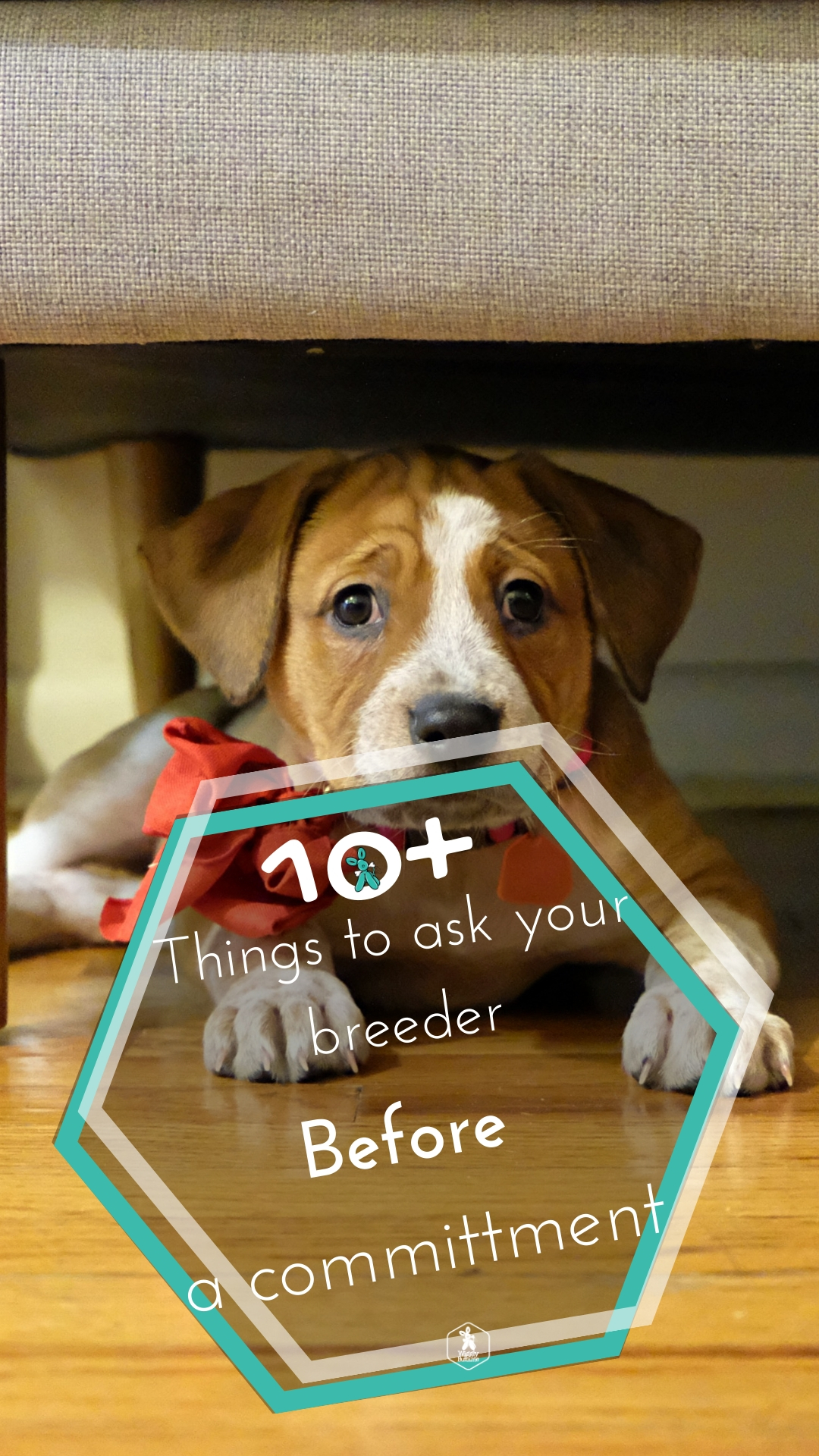Not all breeders are created equally.

Keep reading if you:
- Are considering adopting from a breeder
- Are not sure what you should ask your breeder
- Need help navigating dog breeders
What should you be asking your dog breeder?

You have researched the breed you are interested in thoroughly and have decided to adopt a dog. This is exciting news!!!
But, what now? How do you which breeder to support?
- Research the breeder. Are they licensed? Do they need to be licensed?
- Ask questions. If you are thinking it, then it is worth asking.
- You are interviewing breeders. It is not unreasonable to ask to speak with other families that have adopted from previous litters. Social media is a great way to read reviews of breeders and get a sense of what other adoptive families experienced.
- Follow your gut. The dog isn’t the only one instincts. So trust yourself!
let’s get a move on!!
>> Ask to see the parents and pups together
It is not uncommon for the father of the pups to be separated from mom and the litter. So do not be alarmed if is peering at his pups from afar. However, you should still be able to meet dad if he lives on site, or if it is requested before your arrival.
Meeting the parents of the litter may give insight to temperament and size of your future puppy.
Visualizing the space where mom and puppy live can shed light on overall health and living conditions.
Mom and the puppies should be comfortable. They should not be freezing or melting. They should be in a clean and happy space.
>> What are some personality traits of mom and dad?
Of course you want to know what you are getting yourself into. Every dog is different; every family is different; and training goes a long way. However I am sure you want to know if the parents have dementia, aggression, or other behavioral issues.
Are the parents friendly, playful, energetic, couch potatoes, star athletes, protective or search and rescue heroes?
>> How many puppies are in the litter?
The puppies you see may not be all of the puppies of the litter. Maybe some puppies have been adopted already.
As far as health is goes, it is not uncommon to have a stillborn pup in especially large litters.
If half of the litter died during birth, then that is a different story. What was the cause? Were the puppies sick? How was mom’s health prior to her pregnancy? What level of prenatal care did mom receive? What were mom’s birthing conditions?
>> Genetic or overall health issues
Researching the breed will lead you to know if the puppies may be predisposed to any mental or physical. You can use this knowledge to inquire deeper into the health of the parents.
Many reputable breeders will have results from genetic testing done on the line of dogs they are breeding. The results may indicate that certain health issues may or may not be present in the parent’s lineage.
Do not be afraid to ask if a genetic health screening has been performed on the parents of the puppies.
>> What kind of health care are the parents and puppies currently receiving?
More into the health avenue, it is important to know if the parents were up to date will all of their vaccines and if they needed deworming. Mom may not have had shots or deworming treatments during her pregnancy, and that it ok.
Depending on the age of the litter, what is the breeder’s vaccination and deworming plan for the puppies?
>> How often do you breed your dogs?
You may think, “duh it’s a breeder. Of course they breed dogs often. It is what they do.”
There is no hardened law for every state on commercial or hobby breeding limitations.
Breeding every heat cycle [2 per year depending on breed] or every other heat cycle is controversial. However, breeders have to consider their female’s health and strength.
The dog’s welfare ALWAYS comes before dolla dolla bills yo. Good breeders do not typically breed the same female more than four times in a dog’s life time [on average].
It might change your mind about a breeder if you found out they were breeding the same female every heat cycle for the past 3 years.
The University of Michigan published a list of states with commercial breeding laws and requirements. Check out THIS LINK to find more clarification for each state.
According to The Kennel Club UK, more than 4 litters per female is excessive.
>> What is their feeding regimen and what are the pups eating?
You want to make sure the doggos are being well cared for by the breeder. You also want to learn about the current routine so that the transition post adoption will be as smoothe as possible.
Changing an established routine or specific diet abruptly can absolutely disrupt your new pups digestion, health and temperament.
>> Have the puppies been around other animals?
Puppies can typically go home with their prospective families between seven and eight weeks old. So during those first eight weeks, were the puppies or their environment introduced to animals other than breeders and the parents of the puppies?
A puppy needs to build up their immune system before being introduced into the world outside of their whelping box.
Other animals including dogs, and cats, carry diseases and parasites that can be fatal to the puppies.
You want to make sure the puppies are healthy before taking them home away from their mothers.
>> Do the pups have any training?
Your puppy will probably be eight weeks by the time they head to their new home. In the last eight weeks, they have grown and learned a tremendous amount.
This new puppy of yours may already have some habits. Good or bad, definitely find out. Knowing their eating, potty, and playing habits will set you off to a goof start.
Continuing with an established training regimen is easier than starting over. Knowing what the puppy knows already and expects will also ease the transition into new and exciting training exercises.
Sit! Stay! Ahhhhh! No don’t pee there Batman!!!!!!
>> What does the breeder provide along with the pup?
Some breeders may provide a few things when you pick up your pup like:
If you do not know whether they provide any goodies or not, how will you know what to bring with you when picking up your pup?
- Puppy food for a day or two
- A collar
- Simple leash
- Blanket
- A toy
If you do not know whether they provide any goodies or not, how will you know what to bring with you when picking up your pup?
>> What guarantees does your breeder offer?
Do not take it for granted that there are no guarantees since you are essentially buying an animal. At the end of it all, you will be paying hard earned dolla dolla bills for a puppy someone is saying is top of the line and healthy.
What happens if the dog turns out to have a serious health condition within the first week, month or year?
What happens if you can no longer take care of the dog? Does the breeder accept first right of refusal?
What are your breeder’s responsibilities to the pup after adpotion?
Yes, there are plenty of breeders that offer some sort of written guarantee. Check your contract.
>> What paperwork will you get on adoption day?
If the breeder is stating that your puppy is a certified purebred, then there should be legal documents that you are entitled to see for your puppy.
Perhaps the littler has been registered with the AKC? You can ask for pedigree documentation.
There should also be some sort of written sale agreement or signed contract.
Be sure to get copies of your new pup’s medical records and vet information.
>> Are you able to reach out to the breeders for guidance after adoption?
This does not mean you will call your breeder every day with puppy questions, but if you do have specific questions, will the breeder be available to help?
Good breeders can be quite helpful. They know their line best.
>> What requirements does the breeder have for their potential puppy parents?
Breeders can be very protective of their animals. Find out if they require observations of the puppy in their new adoptive environment. Yes, this is pretty much a home study or inspection.
Some breeders may require puppies to complete documented obedience classes or even by spayed/neutered by a specific date.
Be sure to comb through your contract. If Lulu ends up having puppies, or you specifically breed Lulu, then Lulu’s breeder may be entitled to the first pick of her litter.

summary
If you are not sure, ask questions. There is nothing wrong with asking questions.
Definitely do your research, this way you are well educated and know what you are getting yourself into. it is way better to prepared than to scramble when fecal matter hits the rotating apparatus!
Not all breeders are created equally. Some folks call themselves breeders, but they are just in it for the money. You do not want to get trapped by a puppy mill. Puppy mills are terrible. They over breed their females, many of their pups are prone to numerous health issues, they tend to neglect healthcare, and they are generally in it for the money.
Know your rights and don’t take the well being of these animals for granted. You are expanding your family by possibly four feet. It pays to know what you are bringing into your home. Set yourself and your new pup up for success.
Are you a breeder? Have you adopted from a breeder? What would you like to add?



